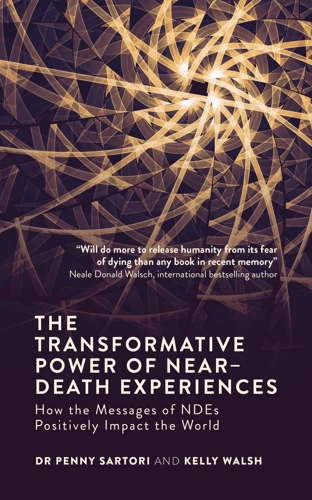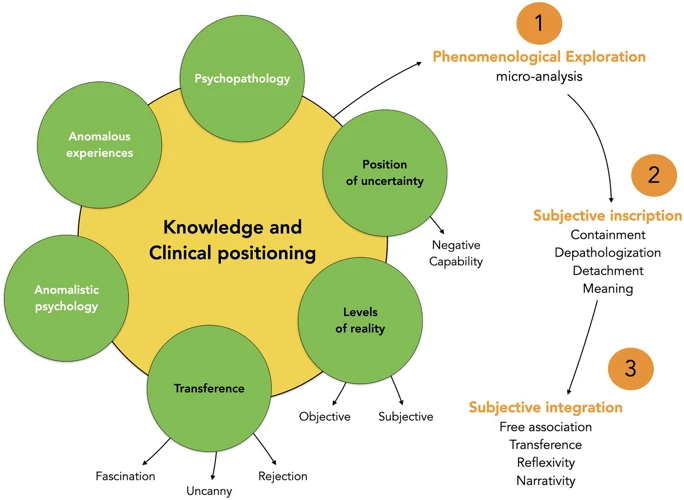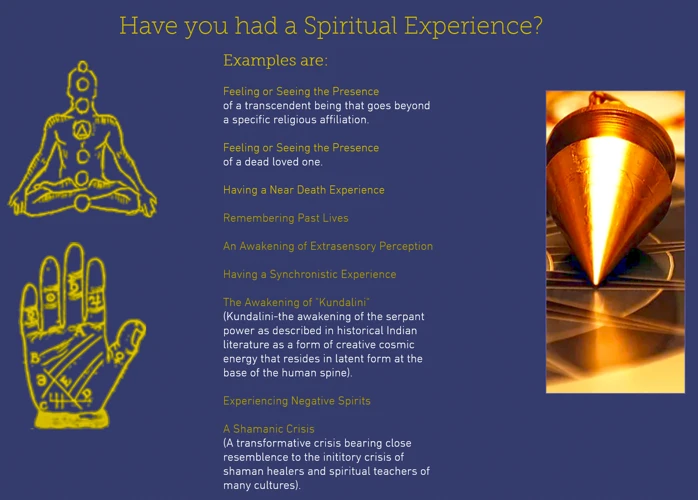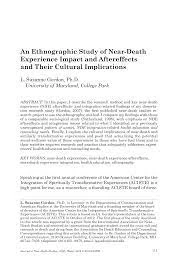As mortal beings, we often wonder what happens to us after we die. One phenomenon that has been widely researched and discussed is the near-death experience (NDE). For those who have experienced it, NDE can be a perplexing and life-altering event that presents more questions than answers. One of the most significant components of an NDE is the encounter with a being – an entity that seems to have a profound impact on the experiencer’s life afterwards. In this article, we will explore the role of the encounter with a being in an NDE, the different types of beings that are encountered, and how this profound experience can transform one’s life.
What is Near-Death Experience?

Near-death experience (NDE) is a phenomenon that has captured the fascination of scientists, spiritualists, and the general public alike. NDEs occur when a person is on the brink of death or has been declared clinically dead, and goes through a range of experiences that include out-of-body experiences (OBEs), encounters with deceased loved ones, divine beings, and extraterrestrial lifeforms. While skeptics dismiss these experiences as mere hallucinations, those who have been through NDEs believe that they provide a glimpse into a realm beyond our physical world. In this article, we delve deeper into the nature of NDEs, the significance of encountering a being in such an experience, and the ways in which it can transform one’s life.
Definition
A Near-Death Experience, commonly known as an NDE, is a profound psychological event that occurs when a person is near death or is in a state of clinical death. During an NDE, individuals often report a range of physical, psychological and spiritual experiences. These experiences can include a sense of being outside one’s body, a feeling of peace and serenity, vivid imagery and hallucinations, and encounters with otherworldly entities or beings.
Among the most striking features of an NDE is the encounter with a being or entity. This can be a deceased loved one, a religious or divine figure, an extraterrestrial or an unknown entity. Such encounters often leave a lasting impact on the individual, transforming their understanding of death, life and the nature of reality.
It is important to note that not all individuals who have an NDE report encountering a being, and the nature of the experience can vary greatly depending on the individual’s cultural and religious background, psychological makeup, and general mindset.
Here are some common experiences reported during an NDE:
- A sense of being outside one’s body
- Intense emotions, such as feelings of peace, love, or joy
- Vivid mental imagery and heightened senses such as vision and hearing
- An encounter with a being or entity
- A life review, in which the individual re-experiences significant events from their past
- A sense of traveling through a tunnel or pathway towards a bright light
An NDE is a complex and multi-faceted experience that is still not fully understood by science. However, the encounter with a being or entity continues to be one of the most intriguing and awe-inspiring aspects of this phenomenon. To learn more about different types of beings that people encounter during NDEs, check out this article.
Common Experiences
A near-death experience (NDE) can be described as the experience of individuals who have been declared clinically dead or near death and report a range of experiences that include bright light, feeling of peace, and encounter with a being. Common experiences during an NDE include an out-of-body experience where individuals report being able to see their physical body from a different perspective, a feeling of traveling through a tunnel, and entering a realm of bright light. Many individuals report encountering deceased loved ones or spiritual beings during NDEs. Some people say they receive a message while in the mystical realm, while others return to life with a life-changing perspective.
There are various common experiences that individuals undergo during NDEs. According to Dr. Raymond Moody, a pioneer researcher of NDEs, there are nine common elements that one can experience during NDEs. These include:
- Out-of-body experience (OBE): This is where people report being able to see their physical body from a different perspective.
- Tunnel experience: Many individuals report traveling through a tunnel towards a light at the end.
- Encounter with a being: People often report encountering deceased loved ones or spiritual beings such as angels or religious figures. Some encounter god or a divine source of energy. To learn more about NDE’s encounter with aliens, please follow the link.
- Life review: A life review is a common experience where individuals report seeing their past life flashing before them. They feel like they’re in a movie or watching their life as an observer.
- Sensations of love and peace: Many individuals experience euphoria, love, and peace during an NDE. They describe feeling completely at peace with life and the universe.
- Unconditional love: The feeling of unconditional love that one feels when encountering the divine during NDEs is often reported by those who have this experience.
- Meeting with entities or souls: Often during NDEs, individuals describe meeting entities or souls who guide them in their journey.
- Encounter with a barrier: Some individuals report encountering a barrier that they can’t cross leading them to feel like they have to return to their physical body.
- Returning to the body: This is perhaps the most critical element of an NDE, as individuals have to return to their body and continue living.
It is important to note that not everyone experiences all these elements in their NDE. The experience can vary from person to person. However, the commonality of these experiences and the life-changing effects that they bring make NDEs a fascinating area of study. To learn more about NDEs encounter with deceased loved ones, please follow the link. Additionally, to compare NDE’s encounter with astral projection, please follow the link.
The Significance of Encounter with a Being in NDE

The encounter with a being during a near-death experience (NDE) is a fascinating and perplexing experience that has captured the attention of researchers and individuals alike. This profound encounter has been described as life-altering, transformative, and even sacred by those who have experienced it. The encounter can take many different forms, with various types of beings being reported. The significance of such an encounter cannot be overstated, as it has the potential to change an individual’s life in profound and meaningful ways. In this section, we will explore the impact of the encounter with a being on the NDE and its aftermath.
Types of Beings Encountered
Encounters with beings during near-death experiences can vary greatly, with individuals reporting interactions with entities that are sometimes described as otherworldly or divine. Here are some of the types of beings that have been commonly reported in these experiences:
| Being | Description |
| Angels | Some individuals report encounters with angelic beings who radiate warmth, love, and peace. These entities often give the impression of being protective and provide reassurance to the person experiencing the NDE. |
| Deceased loved ones | It is not uncommon for individuals to encounter deceased loved ones during an NDE. These entities are often perceived as welcoming and comforting, providing a sense of continuity and reassurance that there is an afterlife. |
| Light beings | Some people report encounters with beings made of light, which are often described as radiant, loving, and benevolent. These entities are thought to represent a higher spiritual plane and may convey a sense of purpose or mission to the experiencer. |
| Guides or mentors | Encounters with guides or mentors are another common experience during NDEs. These entities are often seen as wise, compassionate, and supportive, and may offer guidance or insight into the person’s life path or purpose. |
| Demonic or negative entities | While encounters with negative entities are less common, some people report experiences with entities that convey fear or malevolence. These entities may take on the form of monsters or dark, shadowy figures, and may represent a person’s fears or negative beliefs. |
It’s important to note that the experience of encountering a being during an NDE is largely subjective and can be influenced by a person’s beliefs, cultural background, and personal experiences. Some people may have a more spiritual interpretation of their experience, while others may view it through a psychological or scientific lens. Nevertheless, encounters with beings during NDEs can have a profound impact on a person’s life, and can offer a sense of comfort, guidance, and purpose to those who experience them.
Impact on Life After NDE
After experiencing a near-death experience (NDE), individuals often report a profound impact on their life. The encounter with a being during an NDE can act as a catalyst for transformational change, leading to a greater sense of purpose and improved mental and emotional health.
One of the key ways in which the encounter with a being impacts life after an NDE is through the individual’s spiritual beliefs. Many people report a stronger connection to a higher power or divine force following their NDE, which can have significant implications for their worldview and way of life. This can manifest as a newfound sense of purpose or meaning, as individuals feel called to live a more purposeful and fulfilling life.
The encounter with a being during an NDE can also have a significant impact on an individual’s mental and emotional health. For some, the experience can serve as a source of comfort and reassurance, providing a sense of peace and a newfound ability to cope with stress and difficult emotions. For others, the encounter can be more challenging, as individuals struggle with integrating the experience into their daily life and may experience feelings of confusion, disorientation, or even trauma.
Ultimately, the impact of the encounter with a being on life after an NDE is highly individual and depends on a wide range of factors, from an individual’s spiritual beliefs to their psychological readiness and the specific nature of their NDE. However, by understanding the potential impact of an NDE on an individual’s life, we can better support those who have had such experiences and help them to harness the transformative power of their encounter with a being.
| Positive Impact | Negative Impact |
|---|---|
|
|
Factors Affecting Encounter with a Being

As we delve deeper into the phenomenon of Near-Death Experience, we discover that the encounter with a Being is a significant aspect that plays a vital role in shaping individuals’ experiences. However, it is intriguing to explore the various factors that affect the encounter and why it may not manifest in all cases. These influential aspects include psychological readiness and spiritual beliefs. Understanding these factors can help us comprehend the mechanism at work behind these experiences and assist individuals in harnessing the transformative power of such encounters. Let’s explore each factor in detail.
Psychological Readiness
One of the key factors that can influence the encounter with a being in a near-death experience (NDE) is psychological readiness. This refers to the mental and emotional state of an individual prior to their NDE, with some individuals being more ready than others to undergo a transformative experience.
Psychological Factors
| Fear of Death | Some individuals who have a strong fear of death may struggle to fully surrender to the experience of an NDE, which can limit their ability to have a profound encounter with a being. |
| Openness to New Experiences | Those who are more open-minded and curious by nature may be more likely to embrace the transformative potential of an NDE and therefore be more open to encountering a being during the experience. |
| Mental Health | Individuals who are struggling with mental health issues, such as anxiety or depression, may find it harder to navigate the intense emotions and sensations of an NDE, which could prevent them from having a deep encounter with a being. |
Emotional Factors
| Openness to Vulnerability | Individuals who are open to experiencing vulnerability, and are willing to let go of control during the NDE, may be more likely to have a profound experience with a being. |
| Relationships with Loved Ones | Individuals who have unresolved issues with loved ones, or who have experienced trauma in their relationships, may find it harder to let go of these emotional burdens and fully embrace the encounter with a being. |
It is important to note that psychological readiness is not the only factor that can influence the encounter with a being in an NDE, and that individuals who are not psychologically prepared may still have a transformative experience. However, those who are more prepared may be more likely to have a profound encounter and to reap the benefits of the transformative power of an NDE.
Spiritual Beliefs
One of the factors that can influence whether a person has an encounter with a being during a near-death experience (NDE) is their spiritual beliefs. NDEs have been reported by people from a range of religious and cultural backgrounds, and the beings encountered often reflect the person’s beliefs.
For example, individuals who have a strong belief in a specific deity or religious figure may encounter that figure during their NDE. On the other hand, those who do not have a specific religious belief may experience more abstract or undefined entities.
In a study of NDEs conducted by Kenneth Ring, a psychologist and researcher in the field, it was found that those who identified as having a belief in a personal God were more likely to have a “personal encounter” with a being during their NDE. Additionally, those who held beliefs in an afterlife or reincarnation were more likely to have a positive and transformative experience during their NDE.
However, it is important to note that a person’s spiritual beliefs do not necessarily determine whether they will have an encounter with a being during an NDE. Some individuals who have no particular spiritual beliefs have still reported encounters with beings during their NDE.
It is also worth considering that a person’s spiritual beliefs may change or evolve as a result of their NDE. The encounter with a being may challenge pre-existing beliefs or lead to a deepening of spiritual beliefs, depending on the individual’s experience.
It can be concluded that while spiritual beliefs can play a role in whether a person has an encounter with a being during an NDE, they are not the only factor at play. The unique nature of each individual’s experience makes it difficult to make definitive claims about the relationship between spiritual beliefs and NDEs.
| Factors Affecting Encounter with a Being in NDE | Impact |
|---|---|
| Psychological readiness | May impact whether a person has an NDE at all |
| Spiritual beliefs | May influence the type and nature of beings encountered |
| Personal values and cultural background | May also play a role in the encounter with a being during an NDE |
Ways to Harness the Transformational Power of Encounter with a Being in NDE

For those who have had a near-death experience (NDE) and encountered a being, the encounter can be a deeply transformative and life-changing event. These experiences often leave the individual with a newfound appreciation for life and a desire to harness the power of their encounter to promote greater well-being and personal growth. There are a number of ways in which individuals can effectively harness the transformational power of their NDE encounter, including journaling, meditation, and therapy. Each of these methods can help individuals integrate their experience and derive greater benefit from it.
Journaling
One effective way to harness and integrate the transformative power of encountering a being in a near-death experience is through journaling. Journaling provides an opportunity to reflect on and explore the experience, as well as the emotions and insights that arose from it. The act of writing allows individuals to express themselves in a non-judgmental way, gaining clarity on what they learned, and how it has impacted their life.
One approach to journaling is to begin by simply describing the experience in as much detail as possible. This could include the physical sensations, emotions, and imagery associated with the encounter. From there, journaling can delve into what was learned from the encounter, how it has changed the individual’s perspective, and what actions can be taken to integrate these new insights into daily life.
Additionally, journaling can be used as a tool to track growth and progress over time. By reviewing previous entries, an individual can observe patterns and changes that have occurred as a result of the NDE. This can provide a sense of accomplishment and motivation to continue working towards personal growth and development.
Overall, journaling can be a powerful tool for individuals seeking to understand and integrate their transformative experiences from an NDE. It provides a safe and non-judgmental space for reflection, insights, and continued growth.
Meditation
Meditation is a powerful tool for harnessing the transformational power of encounter with a being in near-death experience. Through meditation, we can create a sacred space in which we can connect with our inner selves and the spiritual realm. This heightened state of awareness can help us to tap into the profound wisdom and guidance that is available to us.
Benefits of Meditation:
- Mental clarity and focus
- Reduced stress and anxiety
- Increased spiritual connection
- Better sleep patterns
- Improved physical health
One simple meditation technique is to focus on your breath. Sit comfortably with your eyes closed and take deep, slow breaths. Pay attention to the sensation of the breath moving in and out of your body. If you start to get distracted, gently bring your attention back to your breath.
Another technique is to visualize a peaceful scene, such as a meadow or beach. Imagine yourself in this scene and focus on the sensations and details of the environment. Allow yourself to let go of any worries or concerns and simply be present in the moment.
It’s important to maintain a regular meditation practice to reap the full benefits. Even a few minutes each day can make a significant difference in your life. By quieting your mind and opening your heart, you can access the transformative power of encounter with a being in near-death experience.
Therapy
Going through a near-death experience (NDE) can be a transformative event, and seeking therapy can be an effective way to harness its power. Here are some ways therapy can help:
- Coping with PTSD: Post-traumatic stress disorder (PTSD) is a common experience for those who have been through a near-death experience. Therapy can help individuals process and cope with the intense emotions associated with PTSD.
- Gaining insight: Therapy can help people gain insight into their NDE and its impact on their life. A therapist can help an individual understand their NDE and how it relates to their current experiences.
- Support: Seeking support from a therapist can provide a supportive and non-judgmental space to discuss experiences related to the NDE. They can provide a safe space to express emotions and seek guidance in integrating the transformative experience into their life.
- Clarifying values: A transformative event like an NDE can lead to a reevaluation of one’s values and priorities. Therapy can help clarify these values and integrate them into one’s life moving forward.
Therapy can be a powerful tool in integrating the transformative experience of an NDE into one’s life. By providing coping mechanisms, emotional support, and guidance in integration, a therapist can help individuals fully harness the transformational power of an NDE.
Benefits of Encounter with a Being in NDE

For those who have had a near-death experience (NDE) that involved encountering a being, the experience can be life-changing. The encounter can bring about numerous benefits to one’s mental, emotional, and spiritual well-being. The transformative power of the encounter with a being in NDE cannot be underestimated. In this section, we explore the various ways in which individuals can benefit from such an experience and how they can harness its power to continue improving their lives. So, let’s dive in and unravel the significance of an encounter with a being in NDE.
Enhanced Spiritual Connection
After experiencing an encounter with a being in near-death experience (NDE), many individuals report a heightened sense of spiritual connection that they had not previously experienced. This connection can take various forms and may manifest in different aspects of their lives. Here are some ways in which individuals may experience an enhanced spiritual connection after an NDE:
| Ways Enhanced Spirituality Can Manifest | Description |
|---|---|
| Deepened Sense of Oneness | Individuals may feel a more profound sense of unity with others and the world around them, recognizing that everything is interconnected and a part of a greater whole. |
| Increased Awareness of Divine Presence | Some people report feeling a stronger connection to a higher power or divine presence. They may feel a sense of guidance, purpose, and protection from this force. |
| Inner Peace and Tranquility | Encountering a being during an NDE can bring a sense of peace to individuals, making them feel more at ease with themselves and their place in the world. |
| Heightened Intuition and Clarity | Many people report a stronger sense of intuition and clearer understanding of their path in life after an NDE. They may feel more attuned to their inner selves and the subtle messages of the universe. |
This enhanced spiritual connection can help individuals live more fulfilling lives, as they feel more connected to themselves, others, and the world around them. The experience of encountering a being can give them a new perspective on life and a sense of purpose that they may not have had before. By embracing this newfound spirituality and using it to guide their actions, individuals can create meaningful and fulfilling lives for themselves.
Greater Sense of Purpose
One of the greatest benefits of encountering a being in a near-death experience is developing a greater sense of purpose. This transformative experience can lead individuals to reevaluate their priorities and goals in life, and often results in a renewed sense of direction and motivation to live a purposeful life.
Some individuals may discover a new passion or calling that they feel a deep connection to. This could range from pursuing a new career path, to becoming more involved in charitable causes, to simply finding joy in seemingly small moments of everyday life. Others may find that their existing career or life choices are no longer fulfilling, and may use this newfound sense of purpose to take steps towards making positive changes.
Ultimately, the experience of encountering a being in a near-death experience can help individuals to realize that their time on earth is precious and should be spent in a way that is meaningful and fulfilling for them. This can result in a shift away from materialistic or superficial pursuits, and towards a focus on personal growth, meaningful relationships, and making a positive impact on the world around them.
To support this renewed sense of purpose, it can be helpful to set clear goals and prioritize actions that align with one’s values and passions. This may require making changes or sacrifices in other areas of life, but the result can be a truly fulfilling sense of purpose and direction.
Developing a greater sense of purpose through encountering a being in a near-death experience can be a life-changing experience that leads to greater happiness, fulfillment, and a stronger connection to oneself and others.
Improved Mental and Emotional Health
Encountering a being during a near-death experience can lead to improved mental and emotional health in many ways. Here are some of the benefits:
- Reduced fear of death: Many people who have had near-death experiences report losing their fear of death. They feel a sense of peace and acceptance about the inevitable end of their physical life.
- Increased positivity: Encountering a benevolent being during an NDE can lead to a shift in mindset towards positivity. This shift can help people see and appreciate the good in the world and in other people.
- Greater empathy: A transformative experience like an NDE can open a person’s heart and make them more empathetic towards others. They may experience a greater sense of interconnectedness with all living beings.
- Improved self-esteem: Encountering a wise and loving being can help people see themselves in a more positive light. They may feel more worthy of self-love and respect.
- Relief from anxiety and depression: Many people who have had NDEs report feeling free from anxiety and depression after the experience. They often describe a feeling of inner peace and tranquility that lasts long after the experience itself.
It is important to note that these benefits may not be immediate or permanent. Some people may need additional support and therapy to fully integrate their NDE experience into their lives. However, for many people, encountering a being during an NDE can be a powerful catalyst for positive change in their mental and emotional well-being.
Challenges in Integrating Transformative Experience from NDE

After a Near-Death Experience (NDE), many individuals report experiencing a profound transformation that can be difficult to integrate into their daily lives. While encountering a being during the NDE can provide a sense of comfort and guidance, the challenges faced in trying to incorporate this transformative experience can be numerous and complex. People who have undergone an NDE often struggle with feelings of isolation, conflicting beliefs and values, and difficulty expressing their experiences in words. The integration of such a transformative event can be a perplexing journey, but with the right guidance and mindset, it is possible to thrive after such an encounter.
Feeling of Isolation
After undergoing a transformational experience in NDE, many individuals may feel a sense of isolation, as they struggle to find others who can relate to their experience. This can be especially challenging if their current social support system lacks an understanding of near-death experiences or spirituality.
When the individual attempts to express what they have experienced, they may face disbelief or skepticism from others who are unable to comprehend the depth and intensity of their experience. As a result, they may feel disconnected from their loved ones and the world around them, leading to feelings of loneliness and even depression.
It is important for those who have had a transformational experience in NDE to know that they are not alone. There are support groups and communities, both in-person and online, for individuals who have undergone similar experiences. They can connect with others, share their story, and find comfort in knowing that there are others who understand what they have gone through.
It is also crucial for them to seek the guidance of a mental health professional who specializes in NDEs or has experience working with individuals who have had spiritual experiences. The therapist can help them process and integrate their experience, providing them with tools to cope with the challenges they may face in the aftermath of their NDE.
It is important for those who have had a transformational experience in NDE to understand that feeling isolated is normal, and seeking out support is essential for their healing and growth.
Conflicting Beliefs and Values
One of the most challenging aspects of integrating a transformative experience from a near-death encounter is when one’s beliefs and values conflict with what one experienced. This can create internal turmoil and cognitive dissonance, as the individual struggles to reconcile their pre-existing worldview with the profound experience they had during the NDE.
For example, someone raised in a strictly scientific, atheistic family might have difficulty accepting the idea of encountering a higher power or spiritual being during their NDE. Similarly, someone with deeply ingrained religious beliefs might struggle to reconcile their encounter with beings from other dimensions or planes of existence.
This conflict can be particularly distressing if the NDE experienced was positive and life-affirming. The individual may feel torn between their desire to hold onto the experience and the fear of rejecting their foundational beliefs and values.
In some cases, this conflict can lead to a profound spiritual crisis, as the individual grapples with questions of identity and purpose. They may feel alienated from their former community or struggle to find a new place within it.
Addressing these issues requires a great deal of self-reflection, and may involve seeking the guidance of a trusted spiritual or religious leader, as well as therapy or other forms of support. Ultimately, the individual must find a way to reconcile their prior beliefs with their newfound understanding, and find a sense of peace and purpose in their ongoing spiritual journey.
| Challenges | Solutions |
|---|---|
| Internal turmoil and cognitive dissonance | Self-reflection, seeking guidance of trusted spiritual or religious leader, therapy/support |
| Alienation from former community | Exploration of new spiritual community, seeking support from like-minded individuals |
| Identity crisis | Self-reflection, seeking guidance of trusted spiritual or religious leader, therapy/support |
Inability to Express in Words
One of the major challenges that people face after experiencing a transformative encounter with a being during a near-death experience is the inability to express in words what they experienced. While the experience may be powerful and life-altering, it can be difficult to convey the enormity of what happened in a way that others can truly understand.
This challenge can be particularly frustrating for individuals who feel a strong desire to share their experience with others in order to help them better understand the nature of existence, the afterlife, and the spiritual realm. However, words often fall short in fully capturing the depth and meaning of the experience, leaving the individual feeling frustrated and misunderstood.
The challenge of expressing the experience in words is further complicated by the fact that the experience is often deeply personal and may touch on subjects that are difficult to articulate. For example, an encounter with a being may involve feelings of love, interconnectedness, and a sense of unity with the universe that can be difficult to explain using standard language or conceptual frameworks.
Despite these challenges, there are ways to work through the inability to express in words and begin to share the experience with others. Some individuals find that creative outlets such as art, music, and poetry can provide a way to express the feelings and insights that come with a transformative experience. Others may find that physical expressions such as dance, movement, or even yoga can help them connect with the experience and share it with others.
Additionally, finding a supportive community of individuals who have had similar experiences can be a powerful way to share the journey and work through the frustration of not being able to find the right words to describe the experience. In this way, individuals can begin to feel less isolated and more understood, even if the experience itself remains ineffable.
Guidelines for Thriving After a Transformational Experience in NDE
For many people who experience a near-death experience (NDE), the encounter with a being can be an incredibly transformative and life-changing event. However, the challenge comes in integrating this profound experience into everyday life. This can be a daunting and confusing process, as one grapples with new insights and perspectives that may not align with their previous beliefs and values. In this section, we will explore some guidelines for thriving after a transformative experience in NDE, focusing on acceptance, understanding, and sharing with others.
Acceptance and Non-judgment
When it comes to thriving after a transformational experience in NDE, acceptance and non-judgment play a crucial role in the process. This involves acknowledging the experience for what it was and refraining from judging it as good or bad.
The table below outlines the key points related to acceptance and non-judgment:
| Key Points | Description |
|---|---|
| Recognize the Experience | It is important to acknowledge the NDE and the impact it has had on your life without denying or minimizing it. |
| Avoid Self-Judgment | It is natural to question one’s experience and reactions to it, but it is essential to avoid harsh self-judgment and instead approach it with an open and accepting mindset. |
| Avoid External Judgment | Others may not understand or accept your experience, but it is important to remain non-judgmental and accept their different perspectives and beliefs. |
| Embrace the Mystery | The transformative experience of a NDE can be difficult to explain, and that is okay. It is important to embrace the mystery and allow yourself to experience the unknown without judgment or fear. |
| Cultivate Inner Peace | Practicing self-care and mindfulness can help cultivate inner peace and acceptance, which can in turn help with the integration of the NDE experience into your everyday life. |
By embracing acceptance and non-judgment, individuals who have undergone a transformational experience in NDE can move towards a more integrated and peaceful existence. It is important to approach the experience with an open mind and heart, and to seek support from like-minded individuals if needed.
Understanding and Integration
After a transformative experience such as a near-death encounter, integrating the experience into everyday life can be challenging but essential for personal growth and healing. Understanding and integration are the keys to successfully incorporating the encounter with a being into one’s life.
One effective way to begin understanding and integrating the experience is through self-reflection. Take the time to evaluate what happened during the near-death experience and how it has impacted your life. Journaling or talking with a trusted friend or therapist can help in this process.
It is also essential to accept the experience as a valid and transformative event. Sometimes people can feel conflicted or confused about their beliefs and what they experienced, but understanding and integration require acceptance of the event as a valuable and real experience.
Once acceptance has been established, the process of integration can begin. This involves weaving the encounter with a being into your day-to-day life, incorporating the lessons and insights gained from the experience. It may take time and patience to fully integrate the experience and its impact on your worldview and belief system.
Strong support systems are also essential in the integration process. Share your experience with like-minded individuals or seek out support groups for those who have undergone similar experiences. Seeking professional help from a therapist who specializes in near-death experiences can also be useful.
The process of understanding and integration requires patience, self-reflection, acceptance, and support. With time and effort, the encounter with a being can be incorporated into everyday life, leading to personal growth, healing, and transformation.
Sharing with Like-minded People
Sharing with Like-minded People is an important part of integrating and thriving after a transformational experience such as an NDE. Seeking out individuals who have had similar experiences can help individuals feel less alone and more understood.
Table 1: Benefits of Sharing with Like-minded People
| Benefit | Description |
|---|---|
| Validation | Sharing with others who have had similar experiences can provide validation and confirmation that the experience was real and meaningful. |
| Support | Like-minded individuals can offer support and understanding, which can be particularly helpful for those who may feel isolated or misunderstood by those who have not had similar experiences. |
| Growth | Discussing the experience with others can also facilitate growth and the integration of the lessons learned from the NDE. |
When seeking out like-minded individuals to share with, it can be helpful to first research NDE support groups or online communities. These groups can offer a safe and supportive space for individuals to share their experiences and connect with others.
It is also important to approach sharing with an open mind and a willingness to listen to others’ experiences. While everyone’s NDE will be unique, there may be common themes and insights that can be gleaned from the stories of others.
However, it is essential to remember that not everyone will understand or accept the NDE experience. Some individuals may have conflicting beliefs or may be skeptical of the validity or significance of NDEs. In these situations, it is important to remain respectful and not force the experience onto others.
Sharing with like-minded individuals can be a valuable step in integrating and thriving after a transformative experience such as an NDE. It can offer validation, support, and opportunities for growth and understanding.
Conclusion
In conclusion, the encounter with a being in a Near-Death Experience (NDE) can have a profound impact on an individual’s perception of themselves, their spiritual beliefs, and their overall outlook on life. The transformative power of such an encounter cannot be overstated, and the benefits of the experience can last a lifetime.
However, integrating and processing the experience can also present various challenges, such as conflicting beliefs and values, difficulties in expressing the experience in words, and feelings of isolation. It is important for individuals who have had a transformative experience in NDE to seek support and guidance in order to successfully navigate these challenges and thrive.
One way to harness the power of the encounter with a being is through journaling, meditation, or therapy. These practices can help individuals process and integrate the experience, leading to enhanced spiritual connection, a greater sense of purpose, and improved mental and emotional well-being.
Ultimately, acceptance, understanding, and sharing with like-minded individuals are key guidelines for thriving after a transformative experience in NDE. By accepting the experience without judgment, seeking to understand its meaning, and sharing with others, individuals can fully embrace the transformational power of their encounter with a being in NDEs, leading to a more fulfilling and meaningful life.
Frequently Asked Questions
What triggers a Near-Death Experience?
A Near-Death Experience can be triggered by various factors, including trauma, illness, surgery, accidents, and sometimes even meditation and spiritual practices.
Why do some people have a transformative experience while others don’t in NDE?
The transformative experience of NDE depends on several factors such as psychological readiness, spiritual beliefs, and the type of encounter with a being. However, not every individual has the same experience, and some may not encounter a being at all.
Can encountering negative beings in NDE have a long-lasting impact on one’s life?
Yes, encountering negative beings in NDE can be traumatizing and have a long-lasting impact on an individual’s life, creating fear, phobias, anxiety or depression that can persist even after many years of the experience.
Is there any scientific evidence to support Near-Death Experiences?
Yes, several scientific studies have been conducted on near-death experiences, including physiological monitoring, brain imaging, and qualitative analysis of individuals’ experiences, which provide significant evidence that NDE is a real phenomenon.
Can the impact of NDE vary based on an individual’s cultural background?
Yes, an individual’s cultural background can influence the interpretation and impact of NDE, as cultural beliefs and values play a significant role in shaping one’s perception and understanding of such experiences.
Can a person experience multiple encounters with beings during an NDE?
Yes, it is not uncommon for individuals to report multiple encounters with different beings during an NDE.
Can people who are blind or deaf from birth have a visual or auditory experience during NDE?
Yes, some individuals who are blind or deaf from birth have reported having visual or auditory experiences during NDE, suggesting that such experiences are not solely based on sensory perception.
Can the transformative impact of NDE be replicated through other means?
While the near-death experience is a unique and transformative experience, several therapeutic methods, such as meditation, psychedelic therapy, or hypnotherapy, have been shown to produce similar transformative experiences in individuals.
Can embracing spirituality before an NDE increase the likelihood of encountering positive beings?
There is no guarantee that embracing spirituality before an NDE will lead to encountering positive beings, but it may increase one’s openness and receptivity to such experiences.
Does every person with an NDE want to share their experience with others?
No, not every person with an NDE wants to share their experience with others. Some individuals may feel uncomfortable or misunderstood when discussing their experience, while others may find it challenging to put their experiences into words.








